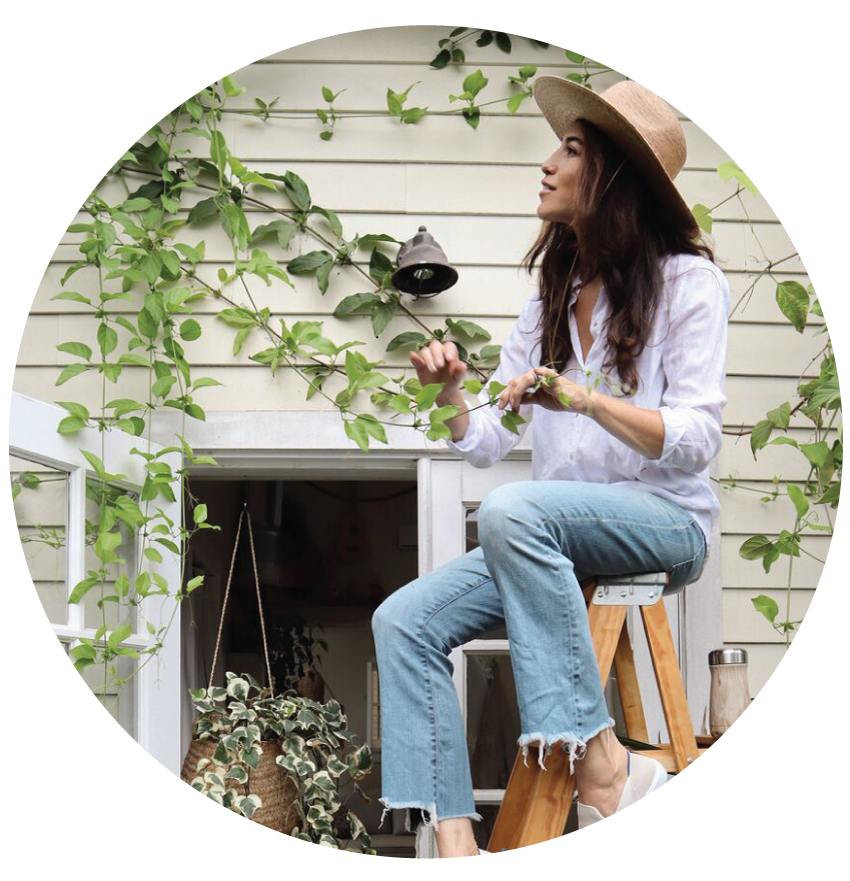Learning about Regenerative Landscaping for the Home
Back in February, I wrote a post entitled Regenerative Small Space Living, in which I shared that I eagerly wanted to see what folks in small urban spaces such as ours can do to take less, give more, and create a future we choose.
At the same time, the pandemic began to spread across the globe, reaching the States just days later.
Above photo from the Cottage taken by Hilton Carter for WILD INTERIORS
In the entry, I shared the intended trajectory for our home and company: “I will continue to center my business upon sharing stories and solutions pertaining to living comfortably and contentedly in small spaces. After all, as humanity adapts to the necessary changes required to combat the climate crisis, we will need to learn how to better share, and live with less stuff (yet with no less abundance). Additionally, Adam and I are also diving headlong into learning about regenerative gardening and practices for small urban spaces. We want to be more than just a resource for comfortable and adaptable small space living. We’re also striving to be a resource for those who are interested in self-sufficient and restorative small space living, requiring less of the Earth, while also giving back to it.”
While we’ve certainly plunged ourselves into this work, the realities of the pandemic shuffled our plans for (re)educating ourselves, as well as our intentions to enroll our son in pre-school. As such, the back-to-school mentality that we’d embraced for all three of us went out the door, as we instead attempted to save whatever money possible, and explore the next steps we'll take as a family in terms of our living situation.
Related posts from 2020: Before & After: Turning our 8’ porch into a grow zone / Before & After: Creating an overhead canopy of vines
Of course as we scramble to reshape our lives (independently and collectively), the impacts of climate crisis remain, and the threats will only continue to increase exponentially in this crucial decade we’ve all now entered.
According to The Future We Choose, one of the steps we must take for survival is to create a greener planet in every space possible. Cities can become exceptional, with more trees, more parks for our children and wildlife, fewer cars, and plenty of urban agriculture. And every town -- no matter the size -- can look to Indigenous practices and wisdom, and embrace land care methods that give back to the Earth rather than poisoning and depleting it.
“Every vacant lot, every grimy unused alley, has been repurposed and turned into a shady grove. Every rooftop has been converted to either a vegetable or floral garden. Windowless buildings that were once scrawled with graffiti are instead carpeted with verdant vines… Things that used to be done individually are now done communally— growing vegetables, capturing rainwater, and composting… In community gardens, on rooftops, at schools, and even hanging from vertical gardens on balconies, food sometimes seems to be growing everywhere.” - The Future We Choose: Surviving the Climate Crisis
As we’re still unable to visit our libraries here in Los Angeles and cannot go back to school as planned, and since we’re navigating the realities of being home together 24/7 for the even-longer run, we’re figuring out other ways to further our education.
Above photo from the Cottage by Lucia Doynel
Shades of Green Permaculture is opening up a new online masterclass that we aim to take in January. Shades of Green is a regenerative landscape design, build and education firm in Atlanta, GA, and is Woman-Owned, a Certified B Corporation and member of the Sustainable Sites Initiative. For over 10 years, Shades of Green has designed and installed regenerative outdoor spaces for commercial, residential and municipal clients that contribute to protecting biodiversity, growing food, medicine, and pollinator habitat, building soil, and restoring the water cycle.
The course, The Regenerative Backyard Blueprint, is a 13-week step-by-step guide to transform participants’ yard into an eco-friendly paradise. The course is designed for those with a residential urban or suburban outdoor space who are looking to gain practical skills in permaculture, resilience, nature connection, and ecology.
The course is intended for folks who:
live in an urban or suburban setting and want a sustainable outdoor space but aren't sure where to begin.
want to grow food, including fruit trees, berries, nut trees, vegetables, culinary and medicinal herbs.
want to help conserve and bolster our pollinator and songbird populations.
want their garden to contribute to the climate solution, and are ready for their landscape to reflect such values.
are ready to plan their outdoor space, no matter how small, so time in the garden can be enjoyed with the knowledge that it’s a healthy and organic environment.
are parents who want their children to know where their food comes from and feel connected to the environment.
are capable of doing some or all of the work, but need direction and help figuring out what actually applies to your a residential-scale project of their size.
Beginning January 4, 2021, participants can expect seven immersive course modules, how-to videos, construction diagrams, implementation tools, virtual site visits, and weekly live Q&As with Shades of Green Founder and Managing Director, Brandy Hall.
For those interested in learning more about the course prior to signing up, Shades of Green is releasing The 3 Pillars of a Regenerative Landscape, a free webinar series starting December 8th.
“Green space is beneficial for community health, happiness and overall success. However, there is significantly less public green space in low-income and BIPOC communities.” - @intersectionalenvironmentalist
I look forward to learning how to improve our own backyard, and I harbor the hope that one day — sooner than later — we’ll all better understand how to transform our towns into places where everyone has access to green spaces and green foods.















